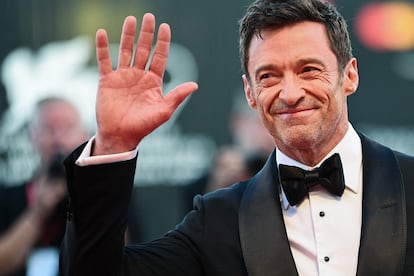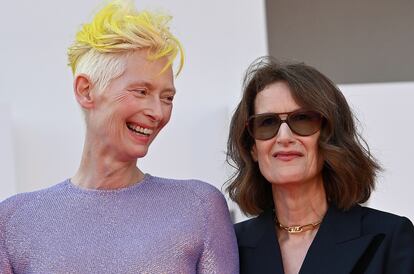Hugh Jackman’s on-screen fathering skills premiere in Venice
In Florian Zeller’s ‘The Son,’ the Australian actor plays a man who doesn’t know how to help his depressed teenager, while Joanna Hogg’s ‘The Eternal Daughter’ and Alice Diop’s ‘Saint Omer’ offer complex and uncomfortable visions of motherhood

It seems like yesterday that The Son’s protagonist Nicholas was a baby who chewed on his feet. Then a little boy learning to swim. But 17 years have passed. And now Nicholas has become a sad, lonely, trapped teenager. How did he grow up so fast? And at what point did he lose his beautiful smile? The world doesn’t understand him. Neither does his father, although he finally decides to try.
Of course, there are only 24 hours in a day and a good part of those are taken up by work. In the remaining hours, Hugh Jackman, the protagonist of The Son, does what he can but it’s never enough. He has to nurture his relationship with his wife, help raise his second recently-born son; and, of course, listen to Nicholas. It’s a race against the clock and he’s always one step behind. And yet this is what happens every day in millions of homes. Because Florian Zeller’s new film, which premiered on September 7 at the Venice Film Festival, addresses the most beautiful and terrifying job in the world for a man: fatherhood. It’s also about mental health and the dark mysteries that lie behind the sullen expression of almost every teenager.
“I chased this role,” said Jackman at the festival. “I haven’t seen the play [of the same name], but I had read the script and I had seen The Father [another play that Zeller turned into a film] and I had a strong beautiful feeling that that part was right for me. I wrote to the director telling him that I would love to play that character. It can be said that I have chased this role.”
For his part, Zeller said he was thrilled when he received a letter from the actor and that all it took was eight minutes of conversation via video call, and the director was convinced.
According to the actor, the role has actually changed his life in some respects. Addressing reporters, Jackman explained that there is a moment in the film that has stuck with him: it is when a psychiatrist reassures him and Nicholas’ mother that sometimes “love is not enough.”
“For many, many years as a parent, the job was to appear strong and dependable and never worried and I don’t want to burden my children;” the actor said. “But, certainly, since this movie I’ve changed my approach. I share my vulnerabilities more with my 17- and 22-year-old and I see their relief when I do. Hopefully the movie does start conversations and reminds us to never worry alone, that we’re all in the same boat.”
Zeller’s The Father got six Oscar nominations last year, including one for Best Picture. Anthony Hopkins went on to nail the award for Best Actor. The film offered one of the most moving portraits of senile dementia to date. But The Son has almost nothing in common with The Father, apart from Hopkins being in the cast. He plays Jackman’s father and his brief appearance somehow sums up the many problems of the film: the script is at times too obvious and, at others, not very plausible. Emotionally, the audience feels manipulated rather than swept along by the artistic and narrative construction.
But the subject is one many of us can identify with: missed opportunities, impossible decisions, grudges that fester. There won’t be many parents who haven’t felt insecure and fallible. And, unfortunately, there are also more and more teenagers suffering from depression. Many feel that their families and society are failing them. Sadly, the film fails to adequately address the issue.
As though in his defense, Zeller said, “Mental health issues are very difficult to explain. We all know people who have everything it takes to be happy but are in terrible pain. I wanted to show the frustration of not knowing exactly where that pain comes from. And that they are not responsible for it.”

Two other films at the festival deal with themes that are similarly timeless and close to home, and which also focus on raising children, but from the mother’s perspective. Saint Omer, by Alice Diop, takes a bold look at infanticide, with almost an hour of the two-hour film taking place in a courtroom where the accused answers the judge’s and lawyers’ questions. As she does so, her words and reflections have a huge impact on a woman who is attending the trial with a view to making a book out of the story.
Meanwhile, Johanna Ogg’s The Eternal Daughter is also a slow-burn. In a ghostly hotel, a daughter listens to her mother’s memories and tries to turn them into a movie. Tilda Swinton plays both roles, a way of insinuating that the boundaries between mother and daughter are blurred. The film reflects on memory, the importance of the family narrative, blood ties and mourning since human beings are born, grow up, grow old and, one day, die.
Tu suscripción se está usando en otro dispositivo
¿Quieres añadir otro usuario a tu suscripción?
Si continúas leyendo en este dispositivo, no se podrá leer en el otro.
FlechaTu suscripción se está usando en otro dispositivo y solo puedes acceder a EL PAÍS desde un dispositivo a la vez.
Si quieres compartir tu cuenta, cambia tu suscripción a la modalidad Premium, así podrás añadir otro usuario. Cada uno accederá con su propia cuenta de email, lo que os permitirá personalizar vuestra experiencia en EL PAÍS.
¿Tienes una suscripción de empresa? Accede aquí para contratar más cuentas.
En el caso de no saber quién está usando tu cuenta, te recomendamos cambiar tu contraseña aquí.
Si decides continuar compartiendo tu cuenta, este mensaje se mostrará en tu dispositivo y en el de la otra persona que está usando tu cuenta de forma indefinida, afectando a tu experiencia de lectura. Puedes consultar aquí los términos y condiciones de la suscripción digital.









































